|
|
|
Sort Order |
|
|
|
Items / Page
|
|
|
|
|
|
|
| Srl | Item |
| 1 |
ID:
165293


|
|
|
|
|
| Summary/Abstract |
This article examines the manner in which advertisements in the Israeli print media from 1951 to 2014 represent nature and landscapes. It shows that from the 1950s through the 1970s, nature was viewed as designed to serve people, represented as it was as Israeli landscapes. From the 1980s onwards, the attitude towards nature became more empathic and sympathetic, resulting in its depiction in advertisements in a ‘green’ image with nascent depictions of global nature. In recent years, the quality of the environment has remained of interest, but it is increasingly accompanied by surrealist and fantastic representations of nature, representing a type of escapism and the desire to observe idealistic and idyllic nature.
|
|
|
|
|
|
|
|
|
|
|
|
|
|
|
|
| 2 |
ID:
165289
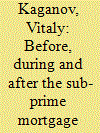

|
|
|
|
|
| Summary/Abstract |
This article examines the connection between investors’ expectations and leading banking crises indicators in Israel before, during and after the sub-prime mortgage crisis. It was found that the coefficients are inconsistent and the indicators cannot be reliable. It was also found that the crisis influence of 2007 is still felt in 2016 and recovering process hasn't been over to this year.
|
|
|
|
|
|
|
|
|
|
|
|
|
|
|
|
| 3 |
ID:
165287
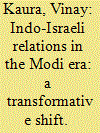

|
|
|
|
|
| Summary/Abstract |
India’s West Asia policy is being constantly reshaped under the tutelage of Indian Prime Minister Narendra Modi, whose Israel visit in July 2017 represents a momentous milestone in the Indo-Israeli relationship. The first ever visit of an Indian prime minister to the Jewish state unambiguously underscores that New Delhi under Modi is confident enough to deal with Israel as it deals with any other state in the volatile West Asian region without being concerned about third parties. Modi has been unequivocal in showing the importance India accords to its ties with Israel.
|
|
|
|
|
|
|
|
|
|
|
|
|
|
|
|
| 4 |
ID:
165288
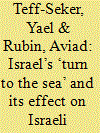

|
|
|
|
|
| Summary/Abstract |
The article analyses the effect of Israel’s new maritime orientation on its foreign policy. It first demonstrates that in the last two decades Israel has changed its maritime posture in three important ways: it has developed energy dependence on offshore gas, begun extensive seawater desalination and dramatically expanded its navy’s platforms and missions. The paper then investigates the effects of these changes on Israel’s bilateral relations with its neighbours. Finally, the paper highlights the cumulative effect of these changes as well as some of their implications for Israel’s foreign policy.
|
|
|
|
|
|
|
|
|
|
|
|
|
|
|
|
| 5 |
ID:
165295
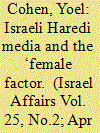

|
|
|
|
|
| Summary/Abstract |
In 2018 the Jerusalem District Court fined the Haredi Kol Barama radio station 1 million shekels ($280,000) for excluding women from the airwaves, stirring outrage within the Haredi community, highly sensitive to appearances of women in public contexts, which had created the station to provide radio broadcasts for its constituents, whose needs were not met by mainstream radio stations. The affair thus serves as a cardinal test of the level of freedom of a radio station, the interests of minority religious audiences, and the powers and responsibilities of the supervising public broadcasting authority.
|
|
|
|
|
|
|
|
|
|
|
|
|
|
|
|
| 6 |
ID:
165292
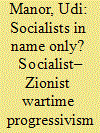

|
|
|
|
|
| Summary/Abstract |
The main challenge for all sorts of progressivism – socialism included – has been to find the right balance between individual rights, group rights and humanity, and from the nineteenth century onwards, nationalism became the preferred road to attain this balance. Labour Zionism, as part and parcel of progressive Zionism, strove from its early days to achieve these goals, enjoying support from West European socialists holding the same progressive convictions. The main obstacle confronted by early Zionist socialists and their non-Jewish partners in their quest for a better world was not the alleged contradictions between universalism, nationalism and individualism, but the enduring tendency to reject the Jewish right for national self-determination. This undying predisposition, prevalent in the first half of the twentieth century among political elites (Arab and otherwise), is still alive in academic circles.
|
|
|
|
|
|
|
|
|
|
|
|
|
|
|
|
| 7 |
ID:
165296


|
|
|
|
|
| Summary/Abstract |
This article seeks to determine the accuracy of predictions made by researchers of Israeli politics regarding the disappearance of the consociational model in state‒religion relations, to be replaced by the emergence of a crisis model, which threatens the stability of Israeli democracy. Using a unique methodological tool, based on the relative importance assigned to the issue in the platforms of the parties, we followed the positioning of the issue on the agenda over the years, and investigated whether it was becoming more prominent since the 1990s as an indication of the crumbling of the consociational model. The findings revealed, indeed, that in the late 1990s the tension around religion‒state relations reached its peak and was reflected in a higher rank order on the agenda. However, during the twenty-first century, the tension has not been rising, while the 2015 elections show a dramatic decline in the issue’s positioning on the agenda, which refutes the researchers’ forecast.
|
|
|
|
|
|
|
|
|
|
|
|
|
|
|
|
| 8 |
ID:
165294


|
|
|
|
|
| Summary/Abstract |
The consistent and continuous rise in traffic congestion on Israeli roads in recent years has been occupying a major place in local media and politics. This article shows that Israel’s transportation policy lacks coherence. While the government has been allocating increasing funds in recent years to developing a public transportation infrastructure, it has also committed enormous sums to developing road infrastructure, higher than those devoted to public transportation. In addition, the share of taxation from motor vehicles has grown substantially, reinforcing the government’s incentive to sustain the increase in the number of vehicles. Hence, it is arguable that Israel’s high traffic congestion is not preordained but rather stems from faulty public policy based on the short-term perspective and political and personal interests of policy makers.
|
|
|
|
|
|
|
|
|
|
|
|
|
|
|
|
| 9 |
ID:
165291
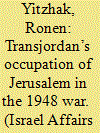

|
|
|
|
|
| Summary/Abstract |
This article describes the road to Transjordan’s occupation of Jerusalem during the 1948 Palestine war. While King Abdullah wanted to invade and occupy the city as part of his grand political ambitions, his British military chief-of-staff, Glubb Pasha, objected to this move due to his fear that Transjordan’s army (the Arab Legion) was not up to the task and that the occupation of Jerusalem, internationalised by the November 1947 UN partition resolution, would spark international outrage. Indeed, London responded to the move by joining the UN arms embargo and suspending military aid to Transjordan. This led to the kingdom’s effective departure from the war with Israel in July 1948, only two months after it had begun.
|
|
|
|
|
|
|
|
|
|
|
|
|
|
|
|
| 10 |
ID:
165290
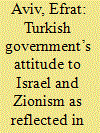

|
|
|
|
|
| Summary/Abstract |
This article explores the Turkish government’s attitude towards Israel during the first years of the AK Party’s rule, as reflected in several military operations by the IDF. The article examines the various responses of Turkish politicians and journalists during the operations and attempts to answer the question of whether the AK Party holds anti-Israel stances or if its members’ responses were confined to the discussed operations only.
|
|
|
|
|
|
|
|
|
|
|
|
|
|
|
|
|
|
|
|
|